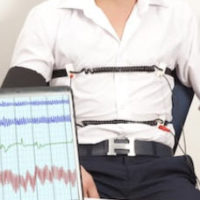Do Polygraph Exams Actually Work?

 This common question has been around as long as the lie detector itself. After all, there is a certain mystique about any device that can claim to read the human mind and give us an unbiased glimpse into another’s thoughts. But does it really do what we think it does? If you watch enough police dramas on TV, you may think the polygraph is practically a substitute for jury intuition. Just plug the witness into the machine, and ask whatever you want, right? Well, not exactly.
This common question has been around as long as the lie detector itself. After all, there is a certain mystique about any device that can claim to read the human mind and give us an unbiased glimpse into another’s thoughts. But does it really do what we think it does? If you watch enough police dramas on TV, you may think the polygraph is practically a substitute for jury intuition. Just plug the witness into the machine, and ask whatever you want, right? Well, not exactly.
History of the Polygraph
The BBC did a great report on the history of the lie detector. The first polygraph machine was invented by Dr. William Moulton Marston almost 100 years ago. He was a psychologist who reached the conclusion that systolic blood pressure could help identify fear, anger, and anxiety, which in turn are potential signs of deception. Of course, even he had his doubts, and in a landmark decision by the U.S. Supreme Court in 1923, Frye v. United States held that scientific evidence could only be admissible at trial if it was generally regarded and accepted by the scientific community.
From that time forward, the so-called lie detector was not permitted as evidence of wrongdoing in American trials. It’s notable that Dr. Marston also was the author of the early Wonder Woman comics. In many ways, his invention was yet another piece of fiction.
What the Psychological Community Thinks of Polygraph Exams
Despite the credibility the media and television police dramas seem to give the polygraph, the American Psychological Association (APA) doesn’t think much of such tests. In fact, the APA calls the tests “more myth than science.” Therefore, courts have generally not allowed testimony about polygraph results to be introduced in trials, because the likelihood of the jury being improperly swayed is just too great.
Psychologists readily tend to agree that a polygraph merely measures vital signs, such as blood pressure, heart rate and so forth. While in some limited situations a deceptive person may fear the test and thus cause these things to trigger the exam, this does not indicate a specific false statement. Rather, it just means people get nervous when being examined. A calm person who has no guilt or remorse is very likely to pass a test, despite lying. Meanwhile a remarkably honest person may be regarded as lying, simply because of the stress of taking the test.
Should You Submit to a Polygraph?
In general, no. Unless you have spoken with an attorney and been advised that there is some unique or specific strategic reason for taking a polygraph, you should refuse these tests. They are not generally regarded as scientific, and they are not reliable evidence. If police or a prosecutor tell you that refusing a test will make you look guilty, ask for a criminal lawyer immediately.
At the Law Offices of Todd K. Mohink, P.A., you can rest assured we will fight to protect you from frivolous or unscientific attempts to get a conviction in absence of real evidence. Our firm is committed to protecting the rights of the accused from start to finish. So give us a call or visit us online to learn more.
Resource:
apa.org/research/action/polygraph.aspx
https://www.marylandlawhelp.com/4-ways-to-beat-a-traffic-ticket-in-maryland/
Anne Arundel County
Empire Towers
7310 Ritchie Highway, Suite 910
Glen Burnie, MD 21061
Phone: 410-766-0113
Fax: 410-766-0270
Howard County On the grounds of Columbia Mall
30 Corporate Center
10440 Little Patuxent Parkway,
Suite 900
Columbia, MD 21044
Phone: 410-964-0050
